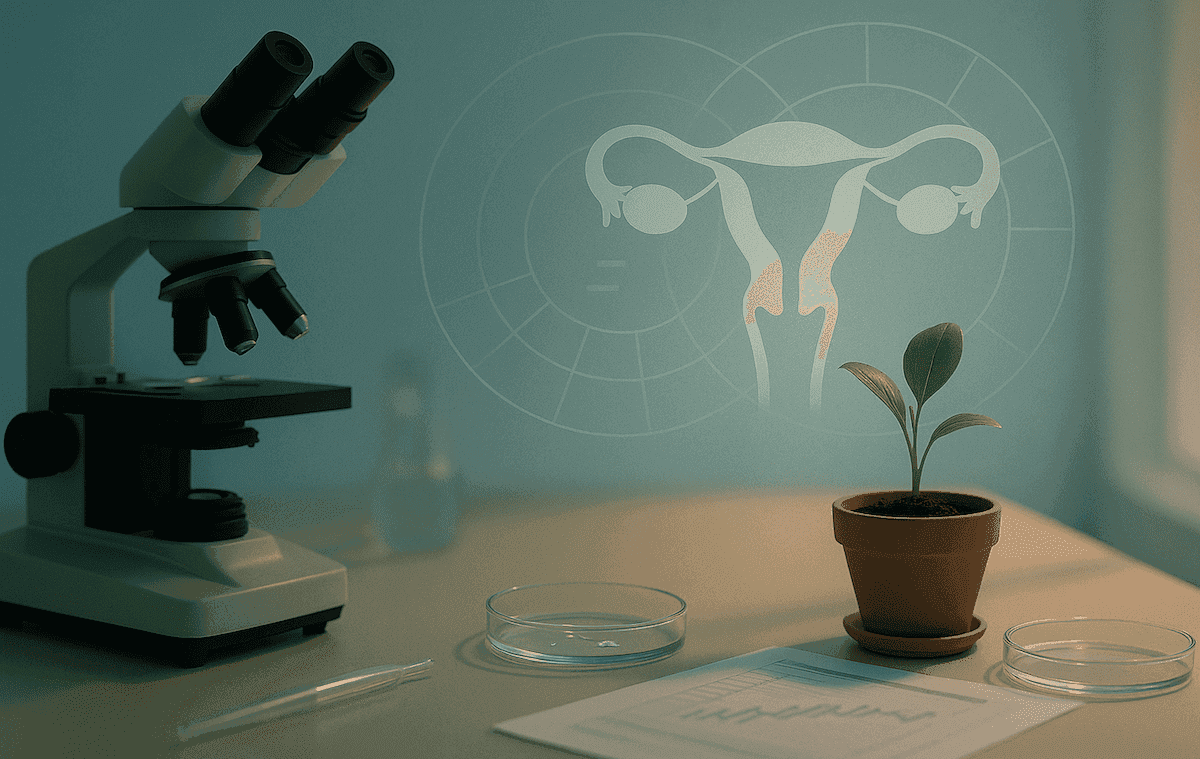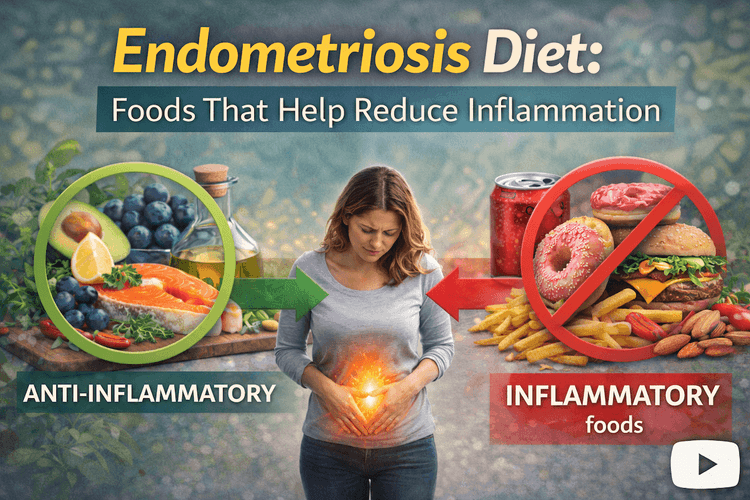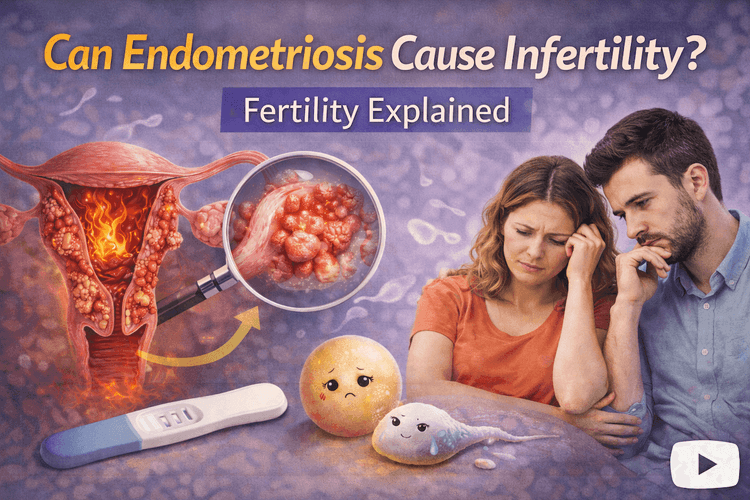Can Endometriosis Cause Infertility: What Science Reveals?

Mona Bungum
Article
8 min

Discover how endometriosis causes infertility and how lifestyle, nutrition, and medical treatment can support conception and healing.
When Emma was 28, her period pain stopped being “normal.”
What used to be a few days of discomfort became weeks of bloating, exhaustion, and stabbing cramps that left her curled up on the floor.
Her doctor told her it was “just bad periods.” It took another four years and several specialists before she finally heard the word endometriosis.
“It was a relief to have a name,” she says. “But it also made me ask, what can I actually do about it?”
For millions of women, Emma’s story is painfully familiar. Endometriosis affects roughly 10% of women of reproductive age according to the World Health Organization, yet it often goes undiagnosed for years. Many only discover it while trying to conceive leading to one of the most common and difficult questions: Can endometriosis cause infertility?
Quick Answer: Yes. Endometriosis can cause infertility in some women by creating inflammation, scar tissue, and hormonal imbalances that interfere with ovulation, fertilization, or implantation. It can also distort pelvic anatomy, block fallopian tubes, and alter egg quality. Research estimates that 30–50% of women with endometriosis experience fertility challenges, though many still conceive naturally or with medical help.
Understanding how and why endometriosis affects fertility allows women to make informed decisions about treatment, recovery, and lifestyle choices that can enhance reproductive health.
What Is Endometriosis?
Endometriosis occurs when tissue similar to the uterine lining, the endometrium, grows outside the uterus. These misplaced cells can attach to the ovaries, fallopian tubes, bladder, bowel, or pelvic walls.
Each month, they respond to hormonal changes thickening, breaking down, and bleeding just like uterine tissue. But since this tissue has nowhere to go, it causes chronic inflammation, scarring, and pain that can affect nearby organs and the uterus itself.
Typical symptoms include:
- Pelvic pain before and during periods
- Pain during intercourse
- Heavy or irregular bleeding
- Digestive discomfort or bloating
- Fatigue
- Difficulty conceiving
Endometriosis is now recognized as a systemic inflammatory and hormonal condition, not just a reproductive disorder.
How Endometriosis Affects Fertility
Endometriosis can interfere with conception in several interconnected ways:
1. Inflammation and Immune Disruption
Inflammation releases cytokines that can damage eggs, sperm, and embryos. This inflammatory environment makes implantation more difficult and increases miscarriage risk.
2. Scar Tissue and Adhesions
Inflammation can lead to scar formation that distorts the uterus or blocks fallopian tubes, making it harder for eggs and sperm to meet.
3. Hormonal Imbalance
Excess estrogen and low progesterone levels can disrupt ovulation and affect uterine receptivity, both vital for conception.
4. Egg and Embryo Quality
Oxidative stress may impair egg quality, lowering fertilization rates and reducing IVF success.
Even with these challenges, many women with endometriosis do conceive. Early diagnosis, lifestyle changes, and integrated fertility care can significantly improve outcomes.
Why It Happens: The Science Behind Endometriosis
Researchers agree there’s no single cause. Instead, endometriosis develops through multiple pathways, including:
- Retrograde menstruation, when menstrual blood flows backward into the pelvis
- Immune dysfunction, which prevents clearing of displaced cells
- Hormonal imbalance, particularly excess estrogen
- Genetic predisposition within families
- Gut microbiome changes that heighten inflammation
- Environmental toxins such as BPA or phthalates that mimic estrogen
Addressing endometriosis requires treating both medical and lifestyle factors, as each contributes to the broader inflammatory process.
Lifestyle Changes That Support Fertility with Endometriosis
Lifestyle adjustments can’t cure endometriosis, but they can influence hormones, inflammation, and pain sensitivity. Scientific research supports several evidence-based areas for improving reproductive outcomes.
1. Nutrition and Anti-Inflammatory Eating
Endometriosis is closely tied to chronic inflammation. An anti-inflammatory diet can reduce symptoms and support fertility.
Focus on:
- Leafy greens, cruciferous vegetables, berries, and citrus
- Omega-3 rich foods such as salmon, sardines, and walnuts
- Olive oil, avocado, turmeric, and ginger
Limit processed meats, refined sugars, caffeine, and alcohol.
A Nutrients (2021) study found that women who followed a Mediterranean-style diet experienced less pelvic pain and higher energy within three months.
Eating this way also supports hormone balance and egg health, similar to the approach outlined in how to improve fertility with PCOS.
2. Balance Estrogen Levels Naturally
Estrogen dominance encourages lesion growth and worsens fertility outcomes. Balance hormones by:
- Increasing dietary fiber with flaxseed, oats, and legumes
- Supporting liver detoxification through cruciferous vegetables and beets
- Reducing alcohol and processed sugar
- Limiting exposure to synthetic fragrances and plastic containers
A fiber-rich diet also promotes healthy gut bacteria that aid estrogen metabolism. Hormonal balance benefits both partners in fertility, which is why shared health awareness is central in how men can play a central role in the fertility journey.
3. Support Gut Health
The gut microbiome helps regulate estrogen and inflammation. Foods rich in probiotics yogurt, kefir, sauerkraut, and kimchi strengthen gut health and hormone balance.
A Frontiers in Endocrinology (2022) review found that probiotic-rich diets improved pain levels and hormonal profiles in women with endometriosis.
4. Movement and Hormonal Health
Gentle, consistent movement helps regulate estrogen, reduce inflammation, and improve circulation.
Try:
- Low-impact cardio like walking or swimming
- Yoga and stretching to relieve pelvic tension
- Strength training to stabilize posture and metabolism
5. Manage Stress and Cortisol Levels
Chronic stress raises cortisol, which disrupts hormonal balance and increases pain sensitivity. Mindfulness, deep breathing, or even light journaling can help regulate the body’s stress response.
A 2022 Frontiers in Psychology study found that mindfulness reduced pelvic pain intensity and improved overall wellbeing. Managing stress and hormone stability supports reproductive health, similar to findings in testosterone, stress, and male fertility.
6. Improve Sleep Quality
Sleep allows the body to restore hormones and reduce inflammation. Poor sleep worsens estrogen imbalance and lowers fertility potential.
Improve rest by:
- Keeping a consistent bedtime
- Reducing blue light before sleep
- Using magnesium or gentle stretching before bed
Adequate sleep supports recovery and hormonal repair, essential for managing both endometriosis and fertility health.
Medical Treatment for Endometriosis and Infertility
Medical treatments focus on reducing lesions and improving fertility potential. Options include:
- Hormonal therapy to suppress ovulation and inflammation
- Pain management with NSAIDs or complementary therapies
- Laparoscopic surgery to remove endometrial tissue or scar adhesions
- Fertility treatments such as IVF when conception remains difficult
Combining lifestyle improvements with medical care offers the best results, reducing recurrence and supporting recovery after surgery.
How Conceivio Helps Women Manage Endometriosis and Fertility
At Conceivio, we take an integrative, science-based approach to reproductive health, helping women understand the root causes behind endometriosis and fertility challenges.
Personalized Hormonal and Inflammation Profiling
Our fertility team analyzes hormone cycles, metabolic markers, and inflammation patterns to identify what drives symptoms and affects fertility.
Nutrition and Fertility Support
We create customized, anti-inflammatory meal plans designed to stabilize hormones, improve energy, and enhance conception potential.
Mind-Body and Pain Coaching
Evidence-based stress management and relaxation practices retrain the nervous system to reduce pain and cortisol naturally.
Integrative Fertility Pathways
We align lifestyle plans with clinical treatment to help women achieve healthier cycles, improved hormonal function, and stronger fertility outcomes.
Frequently Asked Questions About Endometriosis and Fertility
Can you get pregnant if you have endometriosis?
Yes. Many women with endometriosis conceive naturally or with fertility treatments. Early diagnosis, inflammation control, and lifestyle support can improve chances of conception.
How can endometriosis lead to infertility?
Endometriosis can cause inflammation, scar tissue, and hormonal imbalances that affect ovulation, fertilization, or implantation. It can also distort pelvic anatomy, making conception more difficult.
What are the long-term effects of endometriosis?
Without treatment, endometriosis can lead to chronic pelvic pain, heavy bleeding, fatigue, and fertility challenges. It may also affect bowel or bladder function if lesions spread.
Are you 100% infertile if you have endometriosis?
No. Endometriosis does not mean complete infertility. Many women conceive naturally or through assisted reproductive techniques like IVF, especially when inflammation and hormonal balance are managed.
Does removing endometriosis improve fertility?
Yes. Laparoscopic surgery to remove lesions and scar tissue can restore normal anatomy and improve pregnancy rates, especially in moderate to severe cases.
What happens if you don't remove endometriosis?
Untreated endometriosis can cause worsening pain, inflammation, and fertility issues. In severe cases, it can lead to adhesions that affect nearby organs.
What lifestyle causes endometriosis?
No specific lifestyle causes endometriosis, but factors such as chronic stress, poor diet, and exposure to endocrine-disrupting chemicals can worsen hormonal imbalance and inflammation.
What is the life expectancy with endometriosis?
Endometriosis is not life-threatening and does not reduce life expectancy. However, chronic pain and fatigue can significantly affect quality of life if left unmanaged.
Is endometriosis a disability?
In some countries, severe endometriosis is recognized as a disability if it limits daily function or work capacity due to chronic pain and fatigue.
What drink is good for endometriosis?
Anti-inflammatory beverages such as green tea, ginger tea, and turmeric-infused drinks can help lower inflammation and support hormone balance.
What benefits can I claim if I have endometriosis?
Depending on location, women may be eligible for disability benefits, sick leave, or healthcare support if endometriosis impacts work or quality of life.
What not to do if you have endometriosis?
Avoid processed foods, trans fats, alcohol, and exposure to chemical toxins. Chronic stress and sleep deprivation can also worsen symptoms and hormonal imbalance.
What is the root cause of endometriosis?
The cause remains multifactorial involving genetics, immune dysfunction, retrograde menstruation, and environmental influences.
What food aggravates endometriosis?
Processed meats, refined sugar, caffeine, and alcohol may increase inflammation and estrogen dominance, worsening pain and lesion growth.
What vitamin deficiencies are linked to endometriosis?
Low levels of vitamin D, vitamin B12, and omega-3 fatty acids are common in women with endometriosis and may influence inflammation and pain perception.
What is the miracle pill for endometriosis?
There is no single “miracle pill.” Treatments include hormonal therapy, pain management, and anti-inflammatory strategies that work best when tailored to individual needs.
What autoimmune disease is linked to endometriosis?
Studies suggest possible associations with autoimmune conditions such as thyroid disorders, lupus, and rheumatoid arthritis, but more research is needed.
How can I shrink endometriosis naturally?
Adopting an anti-inflammatory diet, maintaining a healthy weight, managing stress, and improving sleep quality can help slow lesion growth and reduce pain naturally.
The Bigger Picture
Endometriosis can make fertility more challenging, but not impossible. With personalized care that addresses both medical and lifestyle factors, many women go on to conceive and reclaim their quality of life.
Emma, now 32, describes her turning point:
“I stopped trying to fight my body and started learning from it. Changing how I eat, move, and rest hasn’t erased my endometriosis but it’s given me my life back.”
At Conceivio, we believe fertility care should be rooted in science, empathy, and personalized guidance. If you’re managing endometriosis or struggling to conceive, our team can help you balance hormones, ease inflammation, and improve your reproductive health.
Reach out to Conceivio today to begin a fertility plan designed around your body and your goals.




















